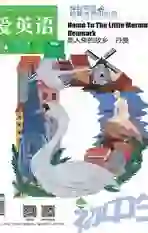你问我答
2019-06-04
Q—Im tired out.
—How can you be manager and accountant at one time? _______
A. The early bird catches the worm. B. Dont put all your eggs in one basket.
C. Actions speak louder than words. D. Dont burn the candle at both ends.
这类试题我从未遇到过,不知道如何解答。
A这一类试题近年来频频出现在各地中考试卷上。它要求考生在领悟语境后,选择最恰当的谚语。英语谚语有其特殊的艺术特性:和谐的音韵、生动的比喻、深厚的文化和警喻功能。学习英语谚语,可以拓展课外知识、了解西方文化、提高人文素养。正因如此,英语谚语也越来越多地受到教材编写者和各类命题人的青睐。
这类题的常见解答思路是:先读懂题干的语意,然后通过“代入法”来逐一排除干扰项,最终得到正确答案。该题为两句对白,上句句意为:“我筋疲力尽。”答句句意为:“你怎么能同时做经理和会计呢?”四个选项中只有D项(蜡烛不可两头点)最符合语境,选D。
同学们在平时的学習中要注意收集一些常见的谚语。如:
1)Many hands make light work. 众人拾柴火焰高。
2)Practice makes perfect. 熟能生巧。
3)The grass is always greener on the other side. 邻家芳草绿。
4)Failure is the mother of success. 失败乃成功之母。
Q“Dont eat _______ meat any more. You are _______ fat now.” The doctor said to the young man.
A. too much; much too??B. too much;too much
C. much too; much too??D. much too;too much
请问如何分辨too much和much too的区别?
AToo much和much too由于单词相似,同学们容易混淆。其实它们的用法可以巧记为:Too much, much too, 去掉前词看后头;
Much可接不可数(名词),有时可作代或副;
Too则修饰形或副,以上规则请记住。
解释:前词为修饰语,后词为中心词,去掉修饰词,句子仍成立,意思通顺。Much可作形容词,修饰不可数名词,也可以作代词或副词。如:
1)Much has been done to stop pollution. 人们采取了许多措施来阻止污染。此时much用作代词。
2)He wants to see the film very much. 他很想看这部电影。此时much用作副词。
回到题目中,第一个空格后的meat为不可数名词,可以确定该空格应该填too much;第二个空格后是形容词fat,可以确定该空格内应该填入much too,选A。
QOur country has _______ great changes in the past 30 years.
A. taken place B. happened
C. experienced D. experiment
我记得老师讲过,表示“发生”应该用take place或happen,可是答案却是C项,请问是不是参考答案错了?
A该题的答案确实应该是C项。Take place 和happen虽然都有“发生”的意思,但都是不及物动词,其后不能跟宾语,首先被排除。Experience意为“经历;经受”,是及物动词,可以跟宾语,符合句意。而experiment意为“实验;试验”,不符合句意。
如果想用take place和happen这两个词,原题可以改为:
1)Great changes have taken place in our country in the past 30 years. 在过去的30年里,我们国家发生了巨大的变化。
2)Great changes have happened in our country in the past 30 years. (句意同上)
Q我碰到一道翻译题,需要翻译这个句子:You cant be too careful. 我的答案是:你不能过分小心。书上的参考答案却是:你要特别小心。我怎么也想不通,老师能讲解一下吗?
A该句中的“cant…too…”在英语中是一个固定结构,其含义是“无论……也不过分”,所以原句不能只从字面翻译。这是一个非常有用也很常见的表达方式,同学们一定要掌握好它,否则在做翻译题和阅读理解题时容易出错。如:
1)We cant be too diligent in studying English. 我们学习英语时要特别勤奋。
2)No man can have too many friends. 朋友越多越好。
